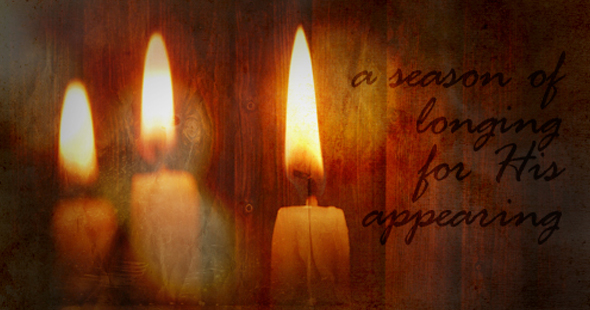I would have to say that the words of Psalm 38 are the first words I ever truly prayed in true longing–in hopes that the God I had heard about all my life was real. Longing that the God I had determined did not exist, truly would exist. The words of Psalm 38 were the first words I had ever truly thrown out into the universe, begging that there be a God big enough to hear them and to answer the anguish of my soul.
O, I had prayed to God long before that. As a child. As a teen. I can barely stand to think of those times. I certainly cannot write about them. And then, following those times, there was a seemingly endless stretch where I did not pray at all. For years.
Today, on this second Sunday of Advent, I’ve taken some time to examine Hope. I’ve poured over Isaiah 40:1-11, and from there I took a look at previous notes I’ve made about Hope, which brought me to Psalm 39. Which always, always, reminds me of Psalm 38, because of its proximity. But today, a fresh connection was made in my mind. And soul.
Psalm 38 is an agonizing Psalm. Psalm 39 is as well. Different from Psalm 38, and yet similar, too. And, here is something very interesting and what I saw for the first time today. Smack dab in the middle of both Psalms, lies hope. Bracketed on both sides by pain, the kernel–the core–is hope. Look first at Psalm 38:15:
But for you, O Lord, do I wait;
it is you, O Lord my God, who will answer.
Right there ensconced on all sides by pain (Vs. 1-14 and Vs. 16-22) is Advent. Right there, is longing. Waiting. Waiting for the only one who can answer.
Look secondly at Psalm 39:7:
“And now, O Lord, for what do I wait?
My hope is in you.
Again, ensconced on all sides by pain (Vs. 1-6 and Vs.8-13) is Advent. Longing. Waiting. Hope found only in the God who answers, according to Psalm 38.
It’s hope that is encased in agony. In groanings. It’s a world, waiting for the birth of the Messiah.
But the birth of Jesus without the death of Jesus, is meaningless. His death for the forgiveness of our sins is what makes the hope–the longing, the waiting–so acute. We may not recognize it as such; however, it is there, in the waiting.
Astoundingly, even that is found in both of these wrenching Psalms.
Return to Psalm 38…to verse 18:
I confess my iniquity;
I am sorry for my sin.
I remember reaching these words in Psalm 38 and coming to a screeching halt. For many reasons, but mainly because I could not find a way around them. The need to confess sin. The need to be sorry for my sin, and not in a “sorry, not sorry” sort of way. Genuine repentance. Repentance that costs something. But I couldn’t pay for my sins, as much as I wanted to. As much as I tried to. I needed a Messiah. A baby, born as God in flesh, willing to lay down His life for me. For my salvation.
Now back to Psalm 39…to verse 8:
Deliver me from all my transgressions.
Deliver me yes, from the pain bracketing the hope. From the agony. But also from all my transgressions. For only then is hope realized. Fully.
Will He though? Will this God-child, this gift to mankind that we can not begin to understand, be able to accomplish the very thing that our sin-sick and weary souls long for?
The answer is found in the words of the prophet Isaiah, who foretold the coming birth of the only one who could provide that forgiveness. Who announced the coming Messiah. Spoken to Jerusalem, yes. True for us, yes. When we call upon His name. See these words here, in Isaiah 40:1-2:
Speak tenderly to Jerusalem,
and cry to her
that her warfare[a] is ended,
that her iniquity is pardoned,
that she has received from the Lord‘s hand
double for all her sins.
We are assured this in 1 John 1:9:
This is wherein hope lies…a child, wrapped in swaddling clothes, lying in a manger. A child, who we are beckoned to gaze upon and live–“Veiled in flesh, the Godhead see; Hail the Incarnate Deity”. The one who would suffer, and die for the forgiveness of our sins, and then be raised again to return some day, to take us home. Home. The only one who sees and knows. The only one who can offer hope in the midst of our pain. The only one who can pardon our iniquities. The only one who can bridge the yawning gap in our souls.
I have stumbled upon a new song this Christmas season–one that my youngest girl and I will have the gift of sharing with our church this Christmas season. The words sum up entirely this hope and the lifting of our shame–the yoke of sin has been broken. He has pierced the night.
He Who Is Mighty (Sovereign Grace)
Oh, the mercy our God has shown
To those who sit in death’s shadow
The sun on high pierced the night
Born was the Cornerstone
Unto us a Son is given, unto us a Child is born
He Who is mighty has done a great thing
Taken on flesh, conquered death’s sting
Shattered the darkness and lifted our shame
Holy is His name
Oh, the freedom our Savior won
The yoke of sin has been broken
Once a slave, now by grace
No more condemnation
Now my soul magnifies the Lord
I rejoice in the God Who saves
I will trust His unfailing love
I will sing His praises all my days


